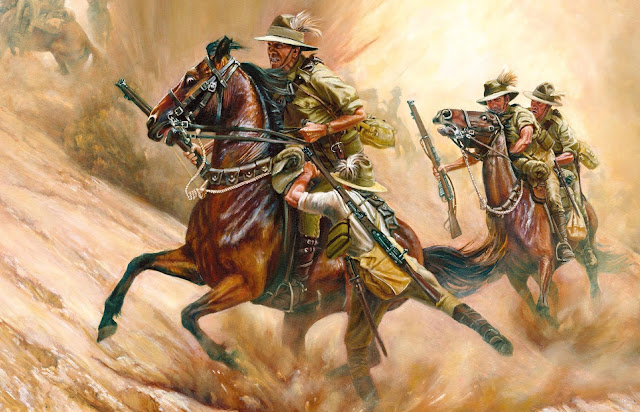------------------oOo------------------
Yesterday I posted a poignant poem by Banjo Paterson (Banjo being the name of his hors, relevant to something said below), the poem being called The Last Parade, about the Australian mounted troops, known as the Light Horse, who served overseas in the Second Boer War and WW 1 with their mounts.
The sadness was that at the end of the wars, the troops were not allowed to bring their horses back home with them because of strict Australian quarantine laws. Many heartbreakingly chose to shoot their beloved horses father than to leave them behind to face uncertain futures, mistreatment, illness and, in some cases, to be eaten.
It prompted Byter Steve M to send me an email:
I found today’s Bytes very moving Otto, some lovely poetry. There’s a terrific song about the WW1 horses by our old mate Eric Bogle. In his live album ‘At This Stage’ he gives a commentary on every track before he sings, which he does with ‘As If He Knows’. So much passion in that song…
Thanks, Steve.
------------------oOo------------------
Eric Bogle’s song As If He Knows can be heard by clicking on:
------------------oOo------------------
Commentary by Eric Bogle on the song:
The story is as follows:The song is of course about the horses sent overseas during WW1 to serve in the various theatres of war. Of the approximately 53000 horses Australia sent overseas during WW1, only one ever returned to Australia after the war. At the end of the war the Anzacs were ordered to get rid of their horses, the authorities did not want them returning to Australia and perhaps bringing in anthrax or TB or suchlike back into the country. Most of the horses were sold or given away, but in Palestine the Light Horsemen refused to give or sell their horses to the Arab population of Palestine, and chose instead to shoot them all. I based the song on an actual Light Horseman called Elijah Conn who had a horse in Palestine called Banjo. Elijah never forgot Banjo and for the rest of his life could not talk about him without tears coming to his eyes.
------------------oOo------------------
Lyrics:
It's as if he knows
He's standing close to me
His breath warm on my sleeve
His head hung low
It's as if he knows
What the dawn will bring
The end of everything
For my old Banjo
And all along the picket lines beneath the desert sky
The Light Horsemen move amongst their mates to say one last goodbye
And the horses stand so quietly
Row on silent row
It's as if they know
Time after time
We rode through shot and shell
We rode in and out of Hell
On their strong backs
Time after time
They brought us safely through
By their swift sure hooves
And their brave hearts
Tomorrow we will form up ranks and march down to the quay
And sail back to our loved ones in that dear land across the sea
While our loyal and true companions
Who asked so little and gave so much
Will lie dead in the dust
For the orders came
No horses to return
We were to abandon them
To be slaves
After all we'd shared
And all that we'd been through
A Nation's gratitude
Was a dusty grave
For we can't leave them to the people here, we'd rather see them dead
So each man will take his best mate's horse with a bullet through the head
For the people here are like their land
Wild and cruel and hard
So Banjo, here's your reward
It's as if he knows, he standing close to me
His breath warm on my sleeve, his head hung low
As he if he knew
------------------oOo------------------
Some images:
Australian light horse monument in Beersheba.
The charge of the 4th Australian Light Horse at Beersheba late in the afternoon of 31 October 1917, is remembered as the last great cavalry charge.
Beersheba is today the largest city in the Negev desert of southern Israel. During WW1 it was part of the Ottoman Empire.
Troopers of the 4th Light Horse Brigade at Beersheeba, 1917
Light horsemen at the charge at Beersheba
Australian lighthorsemen rescue their mates during a tactical retreat during the Battle of Romani, August 1916
Australian light horse in Jerusalem during WWI
Honouring the Australian Light Horse, 2015
Poster for the film The Lighthorsemen – a great watch, culminates in the charge at Beersheba
The Australian Light Horse mounted troopers were identified by the emu plumes in their slouch hats, a source of pride.
Remember Sergeant Sayers' speech to his infantry troops in training as regards an exercise against Light Horse troops:
"As you all know, this
morning's exercise involves a frontal assault on an enemy trench, the enemy
being some "gentlemen" from the Light Horse. These
"gentlemen," presumably because their asses are higher from the
ground that ours, tend to assume airs of superiority. But, they won't have
their horses with them today, so I want you to go out there this morning, and
short of actually killing them, show them the stuff the infantry is MADE OF!"
The 1st Australian Light Horse Brigade moving down from Judea to the capture of Jericho














No comments:
Post a Comment
Note: Only a member of this blog may post a comment.